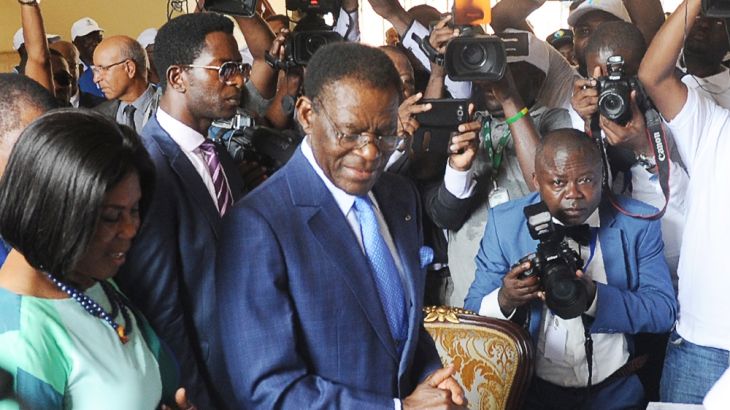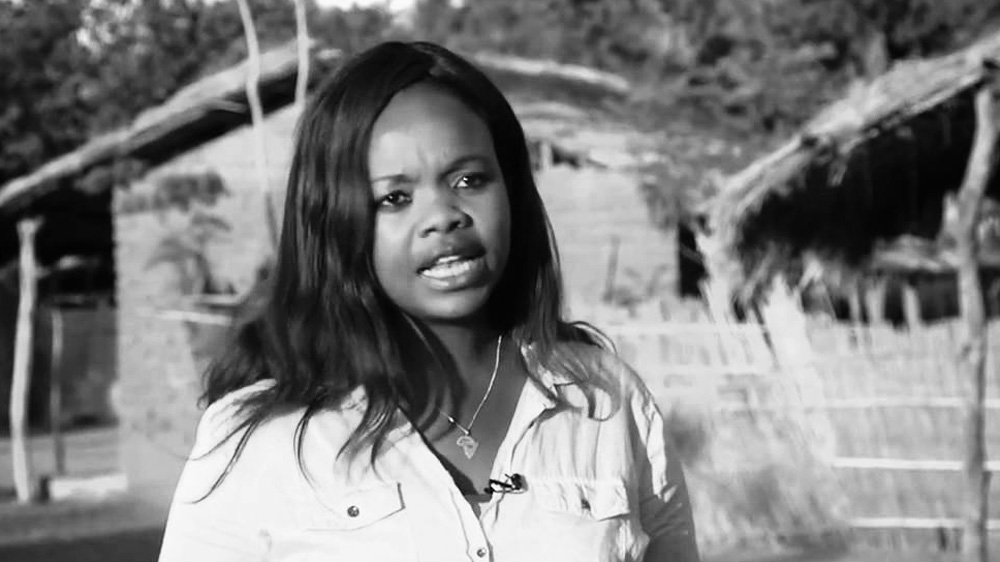Equatorial Guinea election: Incumbent expected to win
Teodoro Obiang Nguema Mbasogo expected to win Equatorial Guinea’s poll, boycotted by much of the opposition.

Citizens of Equatorial Guinea are heading to the polls in a vote expected to hand Teodoro Obiang Nguema Mbasogo, the incumbent president and Africa’s longest serving leader, another seven-year term in office.
The country’s opposition leaders and international civil society groups have already dismissed Sunday’s vote as “not credible”.
Keep reading
list of 4 itemsJeremy Corbyn to run as an independent in UK general election
India Lok Sabha election 2024 Phase 6: Who votes and what’s at stake?
Chad’s Deby sworn in as president as Allamaye Halina named new PM
Obiang, 73, faces six mostly unknown opponents, with most of the opposition boycotting the poll.
Election results will start to come in after the polls close at 9pm local time and final results are expected on Monday.
Obiang, who has ruled Equatorial Guinea for nearly 37 years after overthrowing his uncle in a coup, is accused of presiding over one of the world’s most corrupt and repressive governments.
Income inequality
Critics accuse Obiang of failing to distribute the country’s oil wealth to the population of about 700,000.
According to the poor living in the slums, the money seems to be going to only a few people.
They allege it is going to Obiang’s family, the inner circle of the government.
They say there is not enough distribution of wealth.
| Al Jazeera’s Haru Mutasa, in Bata |
 How do people feel about Obiang running again? His supporters say yes, he’s been in power for nearly 37 years but, especially in the capital, there are good things happening. There is government-subsidised housing, there are developments. But according to the poor living in the slums, the money seems to be going to only a few people. They allege it is going to the president’s family, the inner circle of the government. They say there is not enough distribution of wealth. Some opposition parties are boycotting the election, some are participating. They are saying it was really difficult for them to campaign. They are saying this process won’t be credible. But some key countries have been very quiet about this election. The main thing we want to see right now is how many people come out to vote. The people expect the president to win, but the key thing is the numbers, will the turn out be high? |
Some opposition parties are boycotting the election, but others are participating, although they say campaigning was difficult and have questioned the credibility of the electoral process.
Some key countries have chose to remain quiet about the vote.
According to the United Nations 2014 Human Development Report, the country has the highest per capita gross domestic product of Any African country – about $37,000.
But it ranks 144 out of 187 countries in the Human Development Index that measures social and economic development.
As a result, Equatorial Guinea has by far the world’s largest gap of all countries between its per capita wealth and its human development score.
Al Jazeera’s Haru Mutasa, reporting from the port city of Bata, said many people living in the country are still “poor, frustrated and unemployed”.
“Opposition leaders say much of the nations oil wealth goes to the president and his family,” she said.
“They also accuse some in the international community of ignoring alleged human-rights abuses because of oil interests.”
Equatorial Guinea is the third-largest oil producer in sub-Saharan Africa.
In the last election in 2009, Obiang won 97 percent of the vote.
His Democratic Party of Equatorial Guinea regularly wins parliamentary votes with a similar majority, always falling barely short of 100 percent.
The ability of African leaders like Obiang to stay in power for a long time is rooted in “the lack of mature opposition” in their countries, says Marie-Roger Biloa, editor of the Paris-based Africa International magazine.
The opposition in Equatorial Guinea is practically “nonexistent”, she told Al Jazeera.
“Those who are [in opposition] are not resistant. So it is very easy for the incumbent president to stay, because he is not really challenged.”
Biloa said Obiang’s government is using Equatorial Guinea’s rich oil reserves to silence its critics.
“Equatorial Guinea was a nobody until oil was discovered there roughly 20 years ago,” she said.
“There is a very tiny population. One family is ruling over the country. Oil is a very good shield.”
Opposition parties say campaigning had been difficult in the run-up to Sunday’s vote.
“We are not free here. There is no freedom of speech,” Bonifacio Nguema, UCD party leader, told Al Jazeera.
“Some opposition members have been beaten up and arrested. We live in a police state.”
Arbitrary detention
Amnesty International, the rights-monitoring group, says torture and arbitrary detention of government critics have been routine practices in Equatorial Guinea under Obiang’s rule.
The government denies the allegations of rights abuses and corruption made by the opposition and international rights groups.
Obiang’s supporters say he has strengthened Equatorial Guinea’s economy and brought peace and security to the country.
Gabriel Mbaga Obiang Lima, the energy minister, says political stability is essential for the country and Obiang is the person to provide it for the next seven years.
“We must continue to develop and transform the country,” he said.
“We need to modernise, grow democratically in a climate of humility so we have peace and economic stability.”